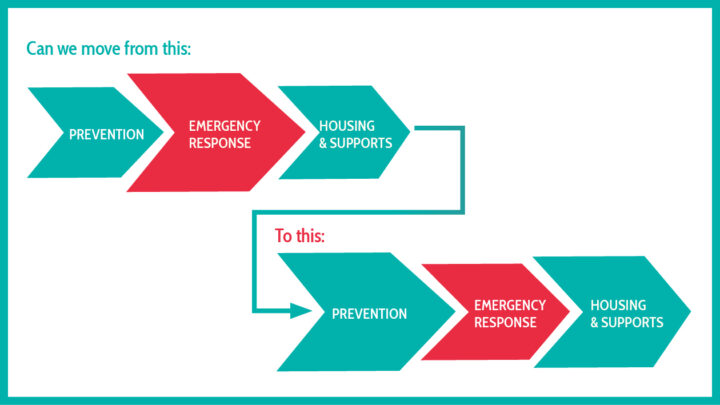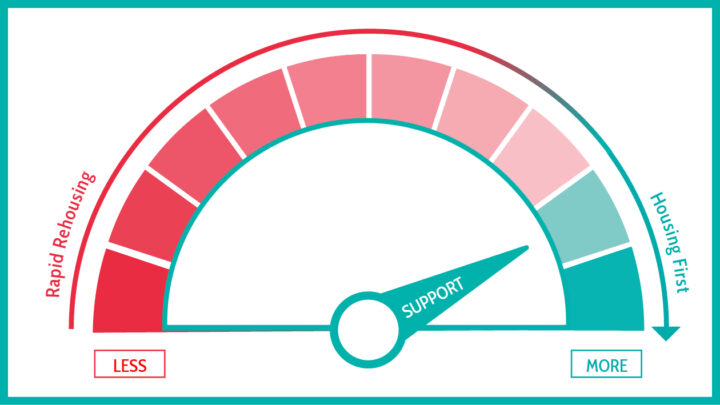SYSTEMS CHANGE & ADVOCACY
In order to have the most impact – both in terms of good outcomes for people living in Housing First, and to help reduce and prevent homelessness, Housing First needs to be part of a housing-led response to homelessness.
Homelessness is not an individual issue but a result of broader structural failures. Housing First works best when policies, funding, and services are aligned to provide long-term housing and support. Instead of treating homelessness as a temporary crisis, systems-wide Housing First focuses on prevention, integration of services, and long-term solutions.
This means shifting from fragmented, short-term interventions, like night shelters, conditional temporary accommodation, and other emergency responses to managing homelessness. Efforts from all levels of government, and from service providers, should work to establish a coordinated response where housing, healthcare, and social support work together.


This shift towards Housing First requires policy reforms, sustainable funding, and cross-sector collaboration to ensure Housing First is not just a project but a core part of national and local homelessness strategies. By embedding Housing First into mainstream housing and social policies, governments can create lasting solutions that move beyond managing homelessness to effectively ending it.
The key ingredients to making this change are:
• Key actors and motivated people
• A shift in working culture
• Structures designed to end and prevent homelessness (housing, policies, etc.)
• Stable and predictable funding
• Policies and political commitment
• Inclusion of different sectors: housing, social care, health, mental health, justice, youth welfare, etc.
Key Examples Systems Change
Finland
Over the past decade, several countries have adopted a Housing First approach to their homelessness policies.
Finland is the leading example of where a Housing First approach has shifted the way that homelessness is addressed and prevented. Finland has spent the past twenty years working to reduce homelessness. Working across different levels of government, Finland’s Housing First approach is based on a the fundamental idea that everyone has the right to live in a home with the support that they need. The evidence is clear: a strong social welfare system, coupled with a consistent investment in social housing, that prioritises allocating homes to people who are homeless or at risk of homelessness, led to over a decade of success in Finland.
publication
A New Systems Change Perspective – Demos Helsinki…
This report by Demos Helsinki examines how Housing First holds great potential to enable systems change in homelessness. Grounding the analysis in systems thinking, the work has engaged decision-makers,…
Find out more herepublication
Achieving a new systems perspective to ending home…
Achieving a new systems perspective to ending homelessness through Housing First: A policy and practice guide Housing First programmes are one of the most researched social policy interventions of…
Find out more hereresource
Book on Finnish Housing First
“A Home of Your Own” is a new book on Finnish Housing First principle. It can be downloaded here and it is free of charge.
Find out more hereScotland
Scotland has shifted to a Housing First and rapid-rehousing approach following the Pathfinder programme which ran from 2019 to 2022. Working with local authorities (cities) and social care and health authorities, local plans were developed to move away from emergency responses to longer term solutions based on housing and support. Scotland runs annual ‘check ups’ to support communities to adhere to the core principles of Housing First in their collaborative work to end and prevent homelessness.
A New Systems Change Perspective – Demos Helsinki…
This report by Demos Helsinki examines how Housing First holds great potential to enable systems change in homelessness. Grounding the analysis in systems thinking, the work has engaged decision-makers,…
Find out more hereHow we made it work: Almond Housing Association Ho…
Since 2017, Almond Housing Association (AHA) has been working in partnership with support provider, Rock Trust (RT) to deliver Housing First for Youth (HF4Y) in West Lothian, Scotland. Following…
Find out more hereAction on Systems Change
resource
Housing First Conference – Dublin 2024
New Horizons in Housing First Since the 2022 conference in Madrid, the Housing First community has made notable steps forward, but also encountered persistent challenges. The New Horizons in…
Find out more hereresource
Housing First Conference – Madrid 2022
An End to Homelessness: Unlocking Systemic Change with Housing First Housing First is the key to unlocking systemic change to end homelessness in Europe by 2030. That is the…
Find out more hereResearch and Other Resources
publication
The European Platform on Combating Homelessness (E…
In this article the authors zoom in on the European Platform to Combatting Homelessness to see how it can be understood as a specific example of collective policy making,…
Find out more hereresource
Shifting the system: Housing First as the path for…
Housing First starts with a simple idea: instead of asking people to prove they are “ready” for housing, it offers immediate access to stable homes, with tailored support. This…
Find out more hereEvents and webinars
Housing First as a System Approach: What Does This…
On April the 4th, join us for a Webinar on ‘Housing First as a System Approach: What Does This Require from the Netherlands?’ The Webinar will start with an…
Find out more herepublication
Housing First as a Systems Approach to Ending Home…
The implementation of Housing First in Canada almost 20 years ago represented a paradigm shift. It pushed back against traditional thinking that placed blame on individuals experiencing homelessness for…
Find out more herepublication
Moving Beyond Shelter Culture: Embedding the Housi…
Since 2018, Lyon Metropolitan Area has been recognised as a region which is “accelerating its implementation of Housing First and its fight against homelessness.” With this in mind, it…
Find out more hereresource
Systems Change and Ending Homelessness – special e…
This special edition of the European Journal on Homelessness is dedicated to Systems Change and Ending Homelessness. You can read 13 articles from a wide range of authors about…
Find out more here